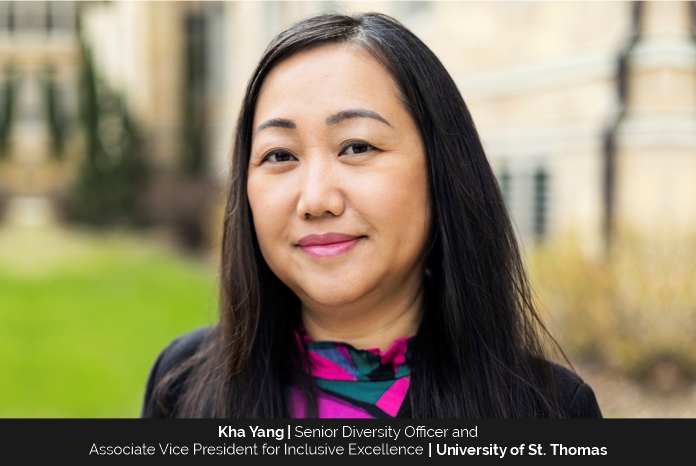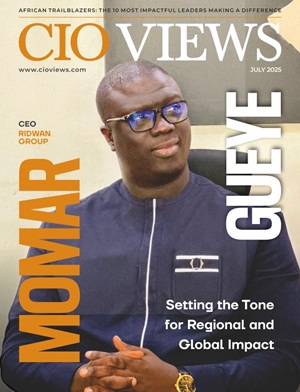
Kha Yang serves as the Senior Diversity Officer and holds the position of Associate Vice President for Inclusive Excellence. In this pivotal leadership role, she plays a crucial part in guiding the university on its ongoing journey towards greater diversity, equity, and inclusivity.
Yang is a Certified Diversity Executive (CDE®) who brings with her a rich and diverse background. As a first-generation Hmong American and a former refugee from Laos, she has a profound commitment to social justice work. Her extensive career spans over two decades and includes roles as a community organizer, human rights investigator, equal employment opportunity consultant, and inclusive program developer.
Having familiarized herself with St. Thomas, Yang is focused on collaborating with individuals and groups across the university to foster a shared vision. She is dedicated to further implementing St. Thomas’ DEI Strategic Plan: The Path Forward Toward Equity, which she led in its development and implementation, and contributing to the institution’s ongoing commitment to a campus community where all can thrive and feel they belong.
Prior to her current role, Yang held the position of Inclusion Programs and Workforce Reporting Manager at the Federal Reserve Bank of Minneapolis. In this role, she was responsible for managing the Bank’s inclusion programs and initiatives, further highlighting her dedication to fostering inclusive and equitable environments.
Redefined Success
Yang firmly believes that success goes beyond reaching an institution’s mission and vision. It involves adopting a holistic approach that leverages institutional talent and embraces active community engagement. She sees success as more than just reaching a destination; it encompasses the entire process of growth, continuous learning, and the creation of meaningful impacts and relationships along the way. In her view, true success is an ongoing journey marked by experiential learning, relationship building, and positive contributions to the individual, the institution, and the broader community.
Journey to Equity and Transformation
Yang acknowledges that assuming the role of a Diversity, Equity, and Inclusion (DEI) executive is not without its challenges and intricacies. Her enduring inspiration for this vital work derives from a blend of personal experiences as a person of color and her professional journey, which has been dedicated to contributing to a just and equitable society. This commitment is particularly pronounced in her current role within higher education.
She finds resonance in the wisdom of Nelson Mandela, who asserted that “Education is the most powerful weapon you can use to change the world.” For Yang, this statement encapsulates a profound truth. She firmly believes in the intrinsic power of each individual to contribute to the transformation of the world into a more just and equitable place. It is this belief in the capacity for continuous growth and positive change that drives her unwavering dedication to DEI work and her role in shaping a better future for all.
Strategies for Overcoming Resistance on the DEI Journey
Yang recognizes that one of the significant challenges in the realm of DEI initiatives is overcoming resistance to change. She understands that this resistance can be a formidable roadblock on the path to achieving more inclusive and equitable environments.
In order to successfully navigate this challenge, Yang emphasizes the importance of building connections that bridge both similarities and differences among individuals and groups. This involves several key strategies like practicing empathy, cultivating cultural competency, employing compassionate communication, relationship building, and consistent engagement to address concerns and misconceptions.
Yang also points out the natural inclination for people to stay within their comfort zones. However, she underscores the importance of pushing boundaries and venturing into spaces of meaningful discomfort on the DEI journey. It is in these spaces that real change and growth can occur. Stepping outside of comfort zones is necessary to challenge existing norms, foster inclusivity, and drive positive transformation in organizations and communities.
Commitment to Diversity, Equity, and Inclusion
The University of St. Thomas is dedicated to establishing an equity-minded campus community, recognizing that this commitment is essential for the institution’s continued relevance and success in advancing academic excellence. To become an institution of choice for prospective students and employees, it is imperative to demonstrate an institutional dedication to fostering environments where everyone, especially marginalized groups, can not only succeed academically or professionally but also feel a genuine sense of belonging.
St. Thomas is committed to fostering an inclusive campus culture that celebrates diversity, promotes equity, and actively engages in practices that ensure the well-being and success of every member of the community, thereby enriching the educational experience and strengthening the institution’s relevance in an ever-evolving world.
St. Thomas has a mission to “educate students to be morally responsible leaders who think critically, act wisely, and work skillfully to advance the common good.” The college experience goes beyond acquiring a degree. St. Thomas strives to provide an education that encourages and challenges students to evolve into active community members and leaders who contribute to meaningful impacts in the broader society.
Champion of Equity
Yang’s passion for DEI work is deeply ingrained in her personal history. As the second youngest of eight children born to refugee parents, she has had to overcome adversity from a young age. This background has instilled in her a strong drive to advocate for herself and others.
Her journey in advocating for DEI principles has been a consistent thread throughout her career, leading her to her current position. Prior to joining St. Thomas, Kha Yang played a significant role in overseeing DEI programs at the Federal Reserve Bank in Minneapolis, where she contributed to increasing employee engagement in fostering inclusive and equitable environments.
Before that, Yang’s professional path included roles as an – investigator and Equal Employment Opportunity (EEO) consultant at the Minnesota Departments of Human Rights and Human Services. In these positions, she not only enforced human and civil rights laws but also worked diligently to create an atmosphere of inclusivity and belonging by advancing employee rights and responsibilities and fostering psychological safety.
St. Thomas recently completed its second iteration of the Diversity & Equity Campus Climate Survey in 2023, with the initial survey occurring in 2020. Yang characterizes the findings as “cautiously optimistic.” The survey results reveal a significant positive shift in the overall campus climate for all members of the community, including US White, US POC, international students, faculty, staff, and individuals in the LGBTQIA+ community.
“DEI is not a sprint it is a marathon. Our efforts at St. Thomas around experiential learning and community building to drive change are propelling us forward. Although we’ve made some positive strides in increasing overall campus climate and a greater sense of belonging, there is still work ahead in closing gaps because not all constituents started their journey from the same place, and gaps exists. The best recognition, however, includes such milestone moments that amount to bigger and lasting change,” says Yang.
Resilience and Resonance
Yang acknowledges that thriving in an executive leadership role as a woman has presented its fair share of challenges. However, she firmly believes that these obstacles have only served to strengthen her determination to leave a lasting impact.
Throughout her journey, Yang has confronted stereotypes associated with her identity, which encompasses being Hmong American and a female. This intersectionality of identity has exposed her to a wide array of experiences within different contexts.
Yang’s approach is to actively challenge these stereotypes and live as the best version of herself. This includes pursuing careers that align with her values and recognizing the importance of self-care as a means to fuel her commitment to this challenging but rewarding work. In doing so, Kha Yang continues to break down barriers and pave the way for greater diversity and inclusion in executive leadership roles.
Trail-Blazing Leadership
The word that aptly describes Yang is “trail-blazing.” Her life journey, stemming from being a former refugee kid, has been marked by numerous “firsts,” from becoming a first-generation college graduate to her current groundbreaking role as the first Hmong American Associate Vice President of Inclusive Excellence.
In her capacity as Associate Vice President, Yang reports directly to President Robert Vischer and serves as the advisor to the President’s Cabinet on matters of DEI. She oversees the Office for Diversity, Equity, and Inclusion, which plays a central role in leading and guiding the university’s ongoing commitment to creating a vibrant campus that fully embraces diversity, seeks equity, and practices inclusion.
Yang’s daily agenda is filled with high-level engagements and meetings, all aimed at listening, learning, and working diligently to effect change for a more inclusive and equitable University of St. Thomas. Her pioneering spirit and commitment to DEI work make her a trailblazer in every sense of the word, and her contributions are shaping a more inclusive future for the institution.
Vision for Elevating Excellence and Inclusivity
Yang shares that the University of St. Thomas’ goal is ambitious: the university envisions cultivating a vibrant campus community where students, faculty, and staff thrive through transformative learning experiences, and propelling the institution’s 10-year vision in advancing to the level of excellence, impact, and reputation that distinguishes the top 10 national Catholic universities. This entails becoming the school of choice that not only recruits but also retains top talent that reflects the diversity of the campus community. This vision is one of continuous improvement and a commitment to excellence in education and inclusivity.
“I believe that a quality education is that students will return to St. Thomas eager to share their stories of how their education here empowered them to think critically and act wisely, enabling them to effectively engage in an ever-evolving world, rather than expressing disappointment in St. Thomas for not equipping them with the experiences and skills needed in navigating diverse perspectives,” says Yang.
Empowering Women Leaders
Yang’s advice for aspiring women leaders is grounded in her own experiences. Breaking barriers in leadership involves challenging and overcoming gender stereotypes and societal norms to pave the way for more women to enter leadership positions. Yang emphasizes the importance of living the best version of oneself while being intentional about continuous self-development, self-awareness, and building relationships and communities that collectively drive change. Her message encourages aspiring women leaders to be both resilient and visionary in their pursuit of leadership roles.




















